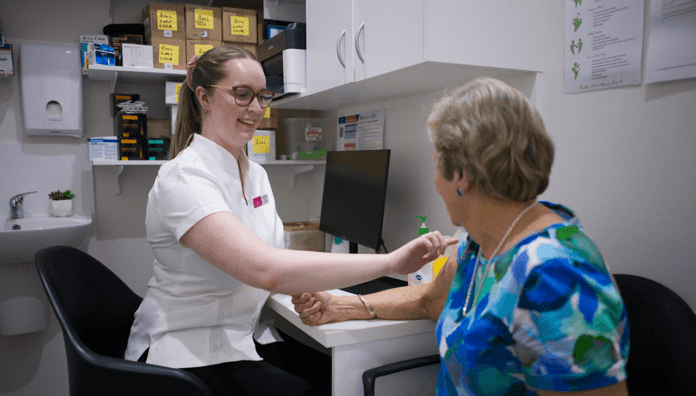When an injection doesn’t go as planned, it can be stressful for both patients and pharmacists. Here’s how to calmly handle these situations while maintaining safety and trust.
Yesterday morning, a mother of two came into a Queensland-based pharmacy requesting emergency contraception.
During the consultation, pharmacist Grace Quach MPS, PSA MIMS Intern Pharmacist of the Year 2023, asked the patient when she had her last period.
‘She had just had a baby 2 months ago, so she hadn’t had her period for 9 months, or a normal period since,’ said Ms Quach. ‘However, she did have a Depo Provera injection last week.’

The patient then revealed that a nurse, supervised by a doctor, administered the injectable contraceptive but pulled out the needle too quickly – leaving the medicine to dribble down her arm.
The GP brushed it off, saying ‘I’m not sure if you’ll get the full amount of protection. See how you go’, leaving the patient stunned.
While mistakes are bound to happen during vaccinations or when administering medicines by injection, there are certain do’s and dont’s that should be followed.
What if a vaccine is partially administered?
If the process of administering a vaccine is interrupted (for example by syringe-needle disconnection), pharmacists should ask themselves:
- how much of the dose has been delivered?
- has it been delivered to the correct site? (for example intramuscularly or subcutaneously).
According to the Australian Immunisation Handbook (AIH), if at least half of the vaccine dose was administered (estimated), it is considered a valid dose.
Should less than half of the vaccine dose be administered, a replacement dose should be administered as soon as feasible.
If a vaccine intended for intramuscular injection is accidentally administered subcutaneously, for example, pharmacists should refer to the vaccine’s product information and the relevant disease-specific chapters in the AIH.
But if the pharmacist is uncertain if enough of the vaccine dose has been administered, they should seek appropriate advice, for example from the National Coronavirus Helpline or state and territory based specialist immunisation centres.
For diseases such as Hepatitis B, a serology test could ascertain if the patient has developed antibodies against the virus within the coming weeks, recommended Pooja Jadeja MPS, pharmacist vaccinator and expert advisor from PSA’s Pharmacist to Pharmacist Advice Line.
‘If they haven’t developed any antibodies, consider revaccinating them with that specific vaccine in conjunction with the prescribers advice,’ she said.
Overall, It’s important that pharmacists remain calm and ensure the patient feels looked after, said Ms Jadeja.
‘There’s no harm in apologising and reassuring the patient that steps [may be able to] be taken to check whether or not they’ve achieved immunity against the [virus],’ she added.
Pharmacists could also put the patient at ease by mentioning that the AIH, developed by Australia’s vaccine expert group ATAGI, recommends that if at least half a vaccine dose is injected, this will suffice.
What if it’s a medicine by injection?
If an injectable medicine was administered incorrectly, there are specific protocols to follow in the event of a missed or partial dose, said Ms Jadeja.
‘Much of that information will be in the product information for that medicine,’ she said. ‘But if not, the next step would be contacting the manufacturer to speak with a medical advisor.’
Again, the advice will vary per medication.
‘[For example], if it was a B12 injection, it might not be as worrisome if a lesser dose was given,’ said Ms Jadeja. ‘The next injection could be moved up in the protocol.’
But if it was a depot medroxyprogesterone acetate, for example, the significance of treatment failure could be higher.
What if another healthcare professional administered the vaccine or medicine?
Should a patient present to a pharmacist querying an injection administered by another provider, the pharmacist should endeavor to get as much information as possible to determine the next steps, said Ms Jadeja.
For example, if it was a vaccine, pharmacists could check whether it was logged on the Australian Immunisation Register.
In the case of the Depot Provera patient above, once Ms Quach had her version of events, she consulted both the Royal Brisbane and Women’s Hospital and Australian Medicines Handbook (AMH), with the latter advising that the next injection could be administered up to 2 weeks earlier than when it was due.
However, that would mean the patient would have to wait at least 10 weeks for contraception protection peace of mind.
The next step was to contact the manufacturer (Pfizer), who said there was no clear timeframe for the safest earliest time to administer the medicine.
‘They have a protocol for failed injections, but not specifically for the contraception indication,’ she said.
Although the patient ultimately took emergency contraception, Ms. Quach recorded her details to follow up with additional information after further investigation.
While the patient’s GP was also not comfortable inserting a hormonal intrauterine device until she is 6 months postpartum, Ms Quach was able to find variable advice.
‘She could find another doctor and get the Mirena, which can be put in 48 hours after having a baby,’ she said.
What if the patient doesn’t say anything?
Patients won’t always speak up if they are concerned that a vaccine or medicine by injection has been administered incorrectly.
So it’s important that the administrator ensures the patient feels they’ve received appropriate therapy, said Ms Jadeja.
‘If there’s any indication that they haven’t, the [administrator] should address that,’ she said.
For example, this could entail letting a patient know that more than 50% of the vaccine was administered, if this was the case, which is deemed enough to form an immune response according to ATAGI.
‘The patient [should not be put in a position] where they are unsure of whether or not they’ve received correct treatment once they leave the vaccination [or medicine by injection] room,’ said Ms Jadeja ‘That also reduces trust in that healthcare professional, which is not a good scenario at the end of the day.’
PSA’s Pharmacist-to-Pharmacist Advice Line offers expert advice to members in real time.
The Pharmacist Advice Line is an exclusive member service offering professional advice from a senior pharmacist on technical, ethical and practice questions. This includes:
- practice-related queries including APF, professional practice standards and guidelines, competency standards
- ethics related queries including code of ethics and/or ethical dilemmas
- technical queries about medicines, compounding and medicine availability
- regulatory queries about legislation and policy matters
- registration queries including CPD requirements and AHPRA requirements.
Speak to PSA’s team of senior pharmacists by calling 1300 369 772 between 8.30am to 5.00pm AEST.



 Dr Peter Tenni[/caption]
Dr Peter Tenni[/caption]
 How should we deprescribe gabapentinoids, according to the Maudsley Deprescribing Guidelines[/caption]
How should we deprescribe gabapentinoids, according to the Maudsley Deprescribing Guidelines[/caption]



 Pharmacists have always prescribed, but they have the potential to prescribe much more
Pharmacists have always prescribed, but they have the potential to prescribe much more





